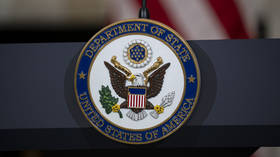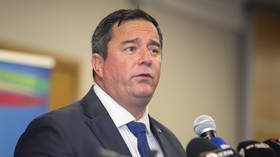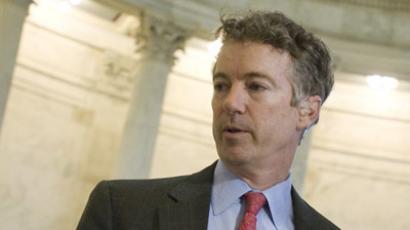Rand Paul: Government spied on Americans 'gazillions' of times

Does the government really peer into the personal business of everyone in America? According to Judge Andrew Napolitano, Senator Rand Paul (R-Kentucky) has put the number of instances that the feds have spied on Americans in the “gazillions.”
In a column published this week by the frequent cable news commentator, Judge Napolitano explains that members of Congress are barred from quoting certain statistics disclosed during secret security briefing, so Sen. Paul — the son of GOP congressman and presidential candidate Rep. Ron Paul (R-Texas) — has reportedly relayed the actual information as accurately as he can without providing a real number.Gazillion, suggests Napolitano, is close enough.“[W]hen asked what he learned at these secret briefings and aware that he could be prosecuted for telling the truth, [Sen. Paul] chose a fictitious word to describe the vast number of violations of privacy at the hands of federal agents: gazillions,” writes Naolitano in an op-ed he has titled “What Rand Paul Learned From Secret Security Hearings.”Napolitano explains that elected lawmakers can “interrogate government officials about government behavior that they are afraid to reveal,” but are prohibited from publicizing that intel outside of Capitol Hill. “Paul's personal courage in using a word like gazillions to convey an oblique message of truth in the face of an unjust law that commanded his silence reminded me of St. Thomas More's silence in the face of an unjust law that commanded his assent to the king's headship of the church,” Napolitano continues, referencing the sixteenth century English philosopher who has since been canonized by the Catholic church.According to the judge, Paul’s claim of “gazillions” includes surveillance made possible by “drones, legal search warrants, illegal search warrants, federal agent-written search warrants and just plain government spying.”In June, Sen. Paul took his crusade against domestic surveillance using unmanned aerial vehicles, or drones, to Congress. He is the main author of the Preserving Freedom from Unwarranted Surveillance Act of 2012, which he hopes will regulate the government’s ability to conduct clandestine watches over its own people."Like other tools used to collect information in law enforcement, in order to use drones a warrant needs to be issued. Americans going about their everyday lives should not be treated like criminals or terrorists and have their rights infringed upon by military tactics," Paul said in a statement that accompanied his proposal.














